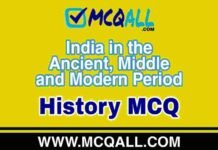Medieval India – History MCQ Question and Answer
Medieval India – History MCQ Question and Answer : Medieval India – History MCQ Question and Answer is given below. This Medieval India – History MCQ / Medieval India – History Quiz / Medieval India – History Question and Answer / Medieval India – History Multiple Choice Question, Short Question, Question and Answer, Suggestion, Notes are very important for school, college and various competitive or job exams and interviews.
Those of you who are looking for Medieval India – History MCQ Question and Answer, can read the questions and answers given below.
Medieval India 3 – History MCQ
- Which of the following civilization flourished on the banks of the Nile River?
(A) Roman civilization
(B) Indus Valley Civilization
(C) Greek civilization
(D) Egyptian Civilization
Answer : D
Solution: Egyptian civilization developed in the basin of the Nile River. The Nile River was the basis of this ancient civilization of the world. Egypt is called the gift of the Nile because in the absence of this river, this land would have been a desert. Egypt is located in the continent of Africa. Its contemporary civilizations were the Indus Valley Civilization (India) and the Mesopotamian Civilization (Iraq).
- Buddha gave the most sermons –
(A) In vaishali
(B) In Shravasti
(C) In kaushambi
(D) In the palace
Answer : B
Solution: Most of Buddha’s disciples were in Kosala state and he gave the most sermons in Shravasti, the capital here.
- The following Mauryan rulers were followers of Buddhism –
- 1.Chandragupta
- 2.Ashoka
- 3.Bindusara
- 4.Dasharatha
Choose the correct answer –
(A)1 and 2
(B)2 and 3
(C)3 and 4
(D)2 and 4
Answer : 2 and 4
Solution: The Mauryan rulers Ashoka and his grandson Dasaratha followed Buddhism. Dasaratha also assumed the title “Devanampriya ” like Ashoka.
- In the Gupta period, the centers located in Gujarat, Bengal, Deccan and Tamil nation were related to?
(A) Textile production
(B) Precious stones and gems
(C) Handicrafts
(D) Opium farming
Answer : A
Solution: Gujarat, Bengal, Deccan and Tamil Nadu were famous for textile production during Gupta period. Textile was a major industry of the Gupta period.
- The Sufi saint who believed that devotional music is a means of approaching God is –
(A) Muinuddin Chishti
(B) Baba Farid
(C) Syed Muhammad Gesudraj
(D) Shah Alam Bukhari
Answer : A
Solution: Sheikh Muinuddin Chishti is credited with promoting Chishti serial in India. He believed in the traditional rules of monotheism and believed in ‘sama’ (music). He believed that devotional music is a means of approaching God.
- Who is the author of ‘Annihilation of Caste’ ?
(A) Jyotirao Phule
(B) Dr. BR Ambedkar
(C) Kanshiram
(D) Rammohan Roy
Answer : B
Solution: Dr. BR, author of the book ‘Annihilation of Cast’ (in 1936) Ambedkar.
- Which of the following was Aurangzeb’s skill in playing a musical instrument?
(A) Sitar
(B) Pakhavaj
(C) Veena
(D) None of the above
Answer : C
Solution: Aurangzeb considered music as anti-Islam and banned it. But during that period most books on Indian classical music were written in Persian language. Aurangzeb himself was a skilled harpist despite being anti-music.
- Which of these Governor Generals first used the system of ‘separate electorate’ to win Muslims and turn them against the Congress?
(A) Lord curzon
(B) Lord dufferin
(C) Lord harding
(D) Lord minto
Answer : D
Solution: In November 1905, Lord Minto was appointed Viceroy of India in place of Lord Curzon and John Marley was appointed Secretary of India. The reforms made by them are known as Marley-Minto (1909 AD) reform. Separate suffrage and separate constituencies for Muslims were established by this act.
- Which of the following statements is / are true?
- (A) After the Nagpur session of the Congress (1920), the Provincial Congress Committees were formed on linguistic basis.
- (B) In the year 1948, the Congress rejected the demand for formation of provinces on linguistic basis.
Choose the correct answer from the following code:
(A) (A) only
(B) (B) only
(C) Neither (A) nor (B)
(D) BOTH A AND B
Answer : D
Solution: In the Nagpur session of the Congress of 1920, the formation of Provincial Congress Committees on linguistic basis was approved. But after independence in 1948, the Congress had rejected the demand for reorganization of provinces on the basis of language.
- What happened in the last of the following?
(A) Harappan policy
(B) Division of Bengal
(C) Permanent settlement
(D) Subsidiary treaty
Answer : B
Solution: In the above events, Lord Cornwallis first introduced a permanent settlement system in 1793 AD. Lord Wellesley (1798-1805) used a subsidiary treaty system to bring Indian states into the English political circle. Lord Dalhousie (1848-56) used the Harappan policy to expand the English Empire. Among the options in question, Bengal was partitioned in the year 1905 by Lord Curzon.
History MCQ Question and Answer
See also: – History MCQ Question and Answer Click Here
Medieval India – History MCQ Question and Answer
Medieval India – History MCQ Question and Answer: Medieval India – History MCQ Question and Answer – Medieval India – History MCQ Question and Answer has been discussed above.
Medieval India – History Multiple Choice Question and Answer
Medieval India – History Multiple Choice Question and Answer: Medieval India – History Multiple Choice Question and Answer – Medieval India – History Multiple Choice Question and Answer discussed above.
Medieval India – History Quiz
Medieval India – History Quiz : Medieval India – History Quiz – Medieval India – History Quiz has been discussed above.
Medieval India – History Questions and Answers in English
Medieval India – History Questions and Answers in English: Medieval India – History Questions and Answers in English – Medieval India – History Questions and Answers in English.
Medieval India – History MCQ Question and Answer
If you benefit from this “Medieval India – History MCQ Question and Answer” post then our efforts will be successful. Also visit our MCQALL.COM website or follow us on various social networking sites (Telegram, Facebook, Youtube, Instagram, Twitter) to know MCQ – Multiple Choice Question Quiz on various topics, questions and answers quiz from GK and Daily Current Affairs. Thank you.












